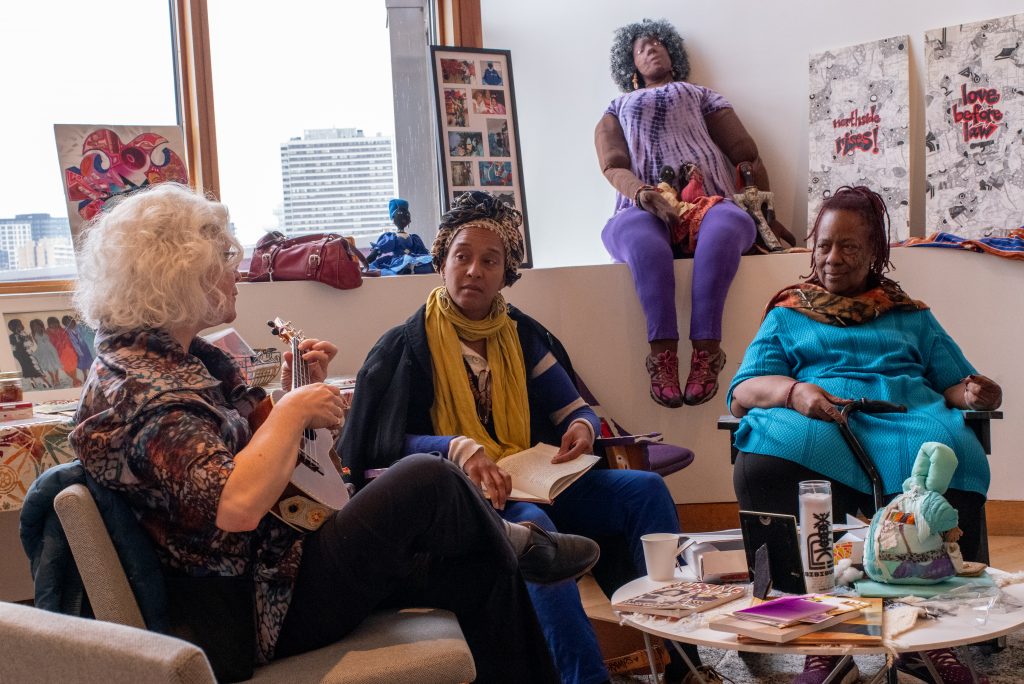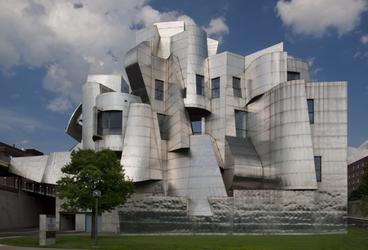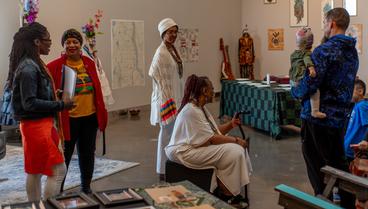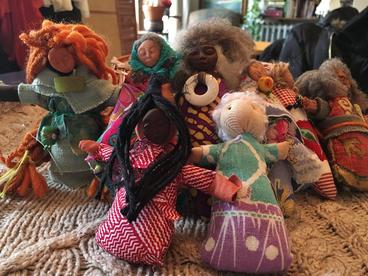Amoke Kubat is an artist, weaver, sacred doll maker, and occasional stand-up comedian, and has been in-residence at the Target Studio since fall 2019. She uses her art to speak truth to power and to maintain a position of wellness in an America sick with inequalities and inequities. In 2010, Amoke founded Yo Mama and The Art of Mothering Workshops, and now YO MAMA’s House Cooperative for women who are artists, mothers, activists, and healers within the rich multicultural community of North Minneapolis. This February, Amoke expands her creative practice: working in concert with North Minneapolis creatives, Amoke will guide visitors' journeys through the daily Northside Black experience in Black to the Future: Northside Black History Month Pop-Up Museum, an Afrofuturistic, unapologetic, and non-apocalyptic vision for a healthy, abundant, and sovereign NORTHKANDA (a portmanteau of the “Northside” and the fictional Afrofuturist nation of “Wakanda”) by those who live, love, and work in North Minneapolis.
Ahead of the opening of YO MAMA’s Northside Black History Month Pop-Up Museum at the Target Studio, I had a chance to sit down with Amoke and discuss the inspirations and motivations behind her work.
Alya Ansari (AA): Tell me a little bit more about the work you do surrounding mothers. Your work develops a concept of ‘radical motherhood’ that throws into the relief both the material labor and the emotional burden that mothers bear—where does Yo Mama’s House sit in relation to ‘radical motherhood’?
Amoke Kubat (AK): I think it’s a radical idea that we look at mothers and motherhood differently than we look at them now. Mothers form the population that perform the most free labor—and we don’t ever think about that, we take it for granted—and that are also the most under-resourced. Mothering can be done by any gender, but is usually thought of as the crap job. The joy of having a baby is one thing, but it usually dissipates when you figure out all the work you have to do - especially unsupported and under resourced.
Radical motherhood is to reclaim the job of childrearing as a way of being, to change who gets to decide what motherhood means. I gotta tell you, I wasn’t the kind of mother who wanted to be at home. I was so bored, sitting around with another human being who babbled, and having to figure out what that person wanted. And after a while you learn what the screams mean, that this cry means “wet butt” and this other cry means ‘”hunger,” and another means “get out of my face,” “I want to be picked up,” “put me in the car”… and mothers have to figure this all out, given that the next child is going to be completely different. I had a husband that often said that I stayed home and played with a baby all day. That’s uninformed thinking and very dismissive. It makes you think, who in their right mind would want to be a mother, given the circumstances of today.
When I moved to the Twin Cities from LA I started working with nonprofits, in some of which I was the first person of color, and essentially became a kind of fascinating roadkill. I noticed that mothers were generally considered incompetent, and especially if they were of color and not part of the homeowning middle class. But programs were giving them advice like “give your kids more vegetables” - that just didn’t match the resources available to these mothers. The Northside only has two grocery stores, for example, so not everybody can get to them and they don’t necessarily have the best produce. Or they were telling mothers that they weren’t preparing their kids for school where they would be evaluated on how well they could, for example, draw a square or a plus sign. Mothers are teaching their kids how to count from 1 to 10, they’re teaching them colors, or to draw a circle, but they don’t teach them how to draw connecting lines because nobody’s telling them that’s what is expected, and is used to determine fine motor developmental and school readiness.
And so my job has become giving mothers the information and resources that have otherwise been inaccessible to them. For example, if they’re teaching their kids to count to 10, I’ll have them teach them to count to 100. If you’re teaching them 10 colors, then get a box of 64 crayons so they begin to notice the gradation between different shades of the same color. As a teacher and as a person who has raised two daughters who are 7 years apart, I know how frustrating it is when the school curriculum changes and you can’t keep up, and I think it’s unfair. There’s no other human being expected to do as much as a mother has to do, and there’s no training or encouragement, you just have to figure it out. It’s the only job on that planet where you have to figure it out, there is no alternative.
And so what I do with mothers is I try to tell them that their work is important, their wisdom is important, where they came from and what they were taught from their mothers, grandmothers, uncles, neighbors, is culturally rich, and that they are capable of doing this job. We need to go back to a radical idea of mothering.
AA: Much of your work speaks to the inequalities and injustices enacted and upheld by institutions, especially along racial lines. How do you see your art intersecting with institutional power?
AK: My lived experience has been very formative in my work. I was born in 1950, I was a little colored baby, female, and three months premature. The idea that I even survived is amazing, and so I think I have a deeply ingrained sense of surviving. My artistic practices have tried to make sense of the world—even as a young person I was in love with the rocks, the sun, the water, the mud, trying to figure out how it all worked together. I feel very connected to the earth, and so I trust my instincts and intuition—and spirit, more than any human being that’s walking around. I am very curious. I have a huge capacity for creativity, and a huge capacity for problem solving. I think having an orphan like life has pushed me to grow and develop and survive.
I saw injustice and inequality very early in life, I knew what it looked like and felt like even if I couldn’t put a name to it. I had a sensitivity for people who could not fight for themselves: growing up, children were to be seen and not heard. This was a very Black sensibility, because if a child spoke their mind or was said to be whistling at a white woman, he could get killed and also could get the whole village burned down. People in my family were different, my grandmother was different, and only later when I asked the question did someone say “she’s a damn Indian.” But she was the one who told me to follow my dreams and listen to spirit, and so I had a very different sensibility that was guiding me as a child. And I had to make peace with my difference: always tap dancing on the margins, always being the other, but it doesn’t bother me anymore. I’ve used my artistic practices to find who I am.
AA: I know that you’re in conversations with potential collaborators about sustainability—climate, communal, architectural, occupational, emotional, and so on. Could you speak a little more about your concerns surrounding sustainability?
AK: I think in this society we have overspecialized so much that we’re like seventy blind men with an elephant. As an example, I had to see three different doctors to get three identical shots for my arthritis. I could not fathom why the same doctor wouldn’t administer the same shot of lidocaine three times. We’ve tried to solve problems by separating things into specialized parts, but instead I’m trying to think holistically to figure out what works as a whole.
Yo Mama’s House is about sustainability with people and in communities, recognizing that everyone has different needs. I can see how the different needs of women—who are just not mothers now, but artists and activists and politicians—can be met in one space where we all resource each other and pool our information and problem-solve. And I think this is the role of art, the power of art, because mothers share their knowledge from different walks of life when brought together over art. These mothers are a multi-ethnic and multi-racial group, and they’re all working in isolation from one another, but they like being together and like to know how the others are raising their kids. And then this art and creativity becomes a source of income for the mothers, who are engaging in financial sustainability by going into these small cottage industries: making jams, medicinal herbs, teas, lotions, dolls, and so on. I’m hoping Yo Mama’s House Cooperative is a model for making mothers independent, making them sovereign.
Black to the Future: Northside Black History Month Pop-Up Museum opens in February 2020 in the Target Studio. Learn more here >>
Learn more about Yo Mama's House here >> You can also support Yo Mama's House by donating to their cooperative here >



